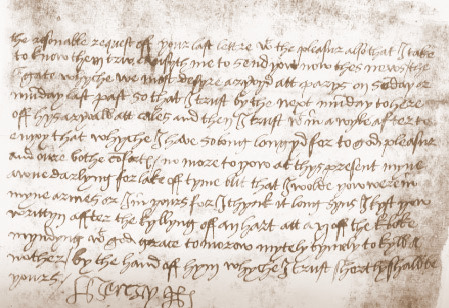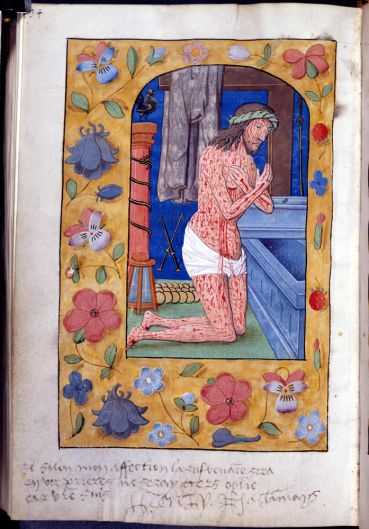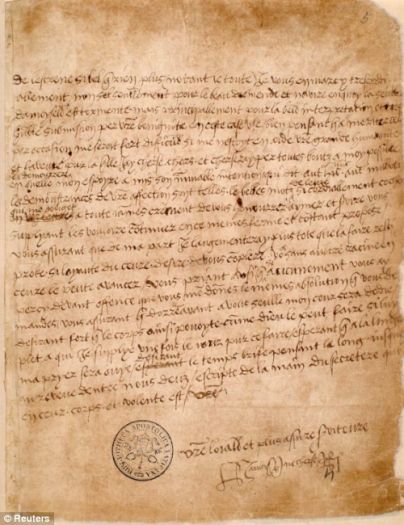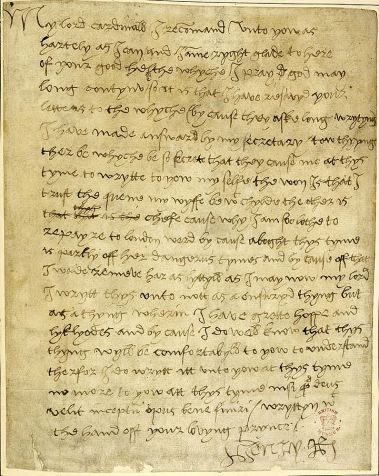King Henry VIII in his own words
Jump to navigation
Jump to search
Henry's handwriting on a love letter to Anne Boleyn [source: Alison Weir's The Six Wives of Henry VIII]  |
"My Mistress and Friend, I and my heart put ourselves in your hands, begging you to recommend us to your good grace and not to let absence lessen your affection... For myself the pang of absence is already too great, and when I think of the increase of what I must needs suffer it would be well nigh intolerable but for my firm hope of your unchangeable affection..." |
There were 17 undated love letters from King Henry VIII to Anne Boleyn before they were betrothed which were found in the Vatican library supposedly stolen by spies at the time. All written in french. |
LINKS:
|
 <a class="external" href="http://www.bl.uk/onlinegallery/onlineex/henryviii/greatmatter/annebol/index.html" rel="nofollow" target="_blank" title="[Source: British Library online]">[Source: British Library online]</a> "Henry and the court regularly attended Mass in the royal chapel, sometimes more than once a day.The King often used the time before the consecration to transact business but this manuscript shows him using a book of prayers to send a flirtatious message to Anne Boleyn instead. He wrote in French: ‘If you remember my love in your prayers as strongly as I adore you, I shall hardly be forgotten, for I am yours. Henry R. forever.’ Presenting himself as lovesick, he wrote his note on a page depicting the man of sorrows. Anne replied with a couplet in English: 'By daily proof you shall me find To be to you both loving and kind.' And, with deliberate enticement, she chose to write her message below a miniature of the Annunciation, the angel telling the Virgin Mary that she would have a son." |
FOR a present so beautiful th  at nothing could be more so (considering the whole of it), I thank you at nothing could be more so (considering the whole of it), I thank youmost cordially, not only on account of the fine diamond and the ship in which the solitary damsel is tossed about, but chiefly for the fine interpretation and the too humble submission which your goodness hath used towards me in this case; for I think it would be very difficult for me to find an occasion to deserve it, if I were not assisted by your great humanity and favour, which I have always sought to seek, and will seek to preserve by all the kindness in my power, in which my hope has placed its unchangeable intention, which says, Aut illic, aut nullibi*.The demonstrations of your affection are such, the beautiful mottoes of the letter so cordially expressed, that they oblige me for ever to honour, love, and serve you sincerely, be seeching you to continue in the same firm and constant purpose, assuring you that, on my part, I will surpass it rather than make it reciprocal, if loyalty of heart and a desire to please you can accomplish this.I beg, also, if at any time before this I have in anyway offended you, that you would give me the same absolution that you ask, assuring you, that henceforward my heart shall be dedicated to you alone. I wish my person was so too. God can do it, if He pleases, to whom I pray every day for that end, hoping that at length my prayers will be heard. I wish the time may be short, but I shall think it long till we see one another.Written by the hand of that secretary, who in heart, body, and will, is, Your loyal and most assured Servant,H. aultre A.B. ne cherse R |
| My mistress and friend: I and my heart put ourselves in your hands, begging you to have them suitors for your good favour, and that your affection for them should not grow less through absence. For it would be a great pity to increase their sorrow since absence does it sufficiently, and more than ever I could have thought possible reminding us of a point in astronomy, which is, that the longer the days are the farther off is the sun, and yet the more fierce. So it is with our love, for by absence we are parted, yet nevertheless it keeps its fervour, at least on my side, and I hope on yours also: assuring you that on my side the ennui of absence is already too much for me: and when I think of the increase of what I must needs suffer it would be well nigh unbearable for me were it not for the firm hope I have and as I cannot be with you in person, I am sending you the nearest possible thing to that, namely, my picture set in a bracelet, with the whole device which you already know. Wishing myself in their place when it shall please you. This by the hand of Your loyal servant and friend H. Rex | Mine own sweetheart, these shall be to advertise you of the great elengeness [loneliness] that I find here since your departing - for I ensure you methinketh the time longer since your departing now last than I was wont to do a whole fortnight. I think your kindness and my fervence of love causeth it for otherwise I would not have thought it possible that for so little a while it should have grieved me - but now that I am coming toward you methinketh my pains been half released, and also, I am right well comforted inasmuch that my book* maketh substantially for my matter, in writing whereof I have spent above four hours this day, which caused me now to write the shorter letter to you at this time because of some pain in my head. Wishing myself (specially an evening) in my sweetheart's arms, whose pretty duckys [breasts] I trust shortly to kiss. Written with the hand of him that was, is and shall be yours by his will HR. *his "book" was A Glasse of the Truthe, arguing that his marriage to Katherine of Aragon was invalid |
| No more to you at this present mine own darling for lack of time but that I would you were in my arms or I in yours for I think it long since I kissed you. Written after the killing of an hart at a xj. of the clock minding with God's grace tomorrow mightily timely to kill another: by the hand of him which I trust shortly shall be yours. Henry R. | My mistress and my friend – My heart and I surrender themselves into your hands, and we supplicate to be commended to your good graces, and that by absence your affection may not be diminished to us, for that would be to augment our pain, which would be a great pity, since absence gives enough, and more than I ever thought could be felt. This brings to my mind a fact in astronomy, which is, that the further the poles are from the sun, notwithstanding, the more searing is the heat. Thus it is with our love: absence has placed distance between us, nevertheless, fervour increases, at least on my part. I hope the same from you, assuring you that in my case the anguish of absence is so great that it would be intolerable, were it not for the firm hope I have of your indissoluble affection towards me. In order to remind you of it, and because I cannot in person be in your presence, I send you the thing that comes nearest that is possible – that is to say, my picture, and the whole device, which you already know of, set in bracelets, wishing myself in their place when it pleases you. This is the hand of Your servant and friend, HR |
| Darling, Though I have scant leisure, yet remembering my promise, I thought it convenient to certify you briefly in what case our affairs stand. As touching a lodging for you, we have gotten one by my Lord Cardinal['s] means, the half whereof could not have been found hereabout, for all causes, as this bearer shall more show you. As touching our other affairs, I ensure you there can be no more done, nor more diligent[ly] used, nor all manner of dangers, better both foreseen and provided for. So that, I trust, it shall be hereafter to both our comfort[s]. The specialties whereof were both too long to be written, and hardly by messenger to be declared wherfore, till your repair hinder I keep something in store, trusting it shall not be long to, for I have caused my lord your father to make his preparations with speed. And thus, for lack of time, darling, I make an end of my letter. Written with the hand of him which I would were yours, H.R It is not the function of a gentleman to take his lady in place of a servant - nevertheless, always following your desires I willingly grant it to you, if thereby you can find yourself less ungrateful for the position chosen by you than for the place given by me. Thanking you most cordially that it pleases you still to have some remembrance of me. B.N.R.I. de R.O.M.V.E.Z. Henry R. | The reasonable request of your last letter, with the pleasure also that I take to know them true, causeth me to send you now this news. The legate, which we most desire, arrived at Paris on Sunday or Monday last past, so that I trust by the next Monday to hear of his arrival at Calais, and then, I trust, within a while after to enjoy that which I have so longed for, to God's pleasure and our both comforts. No more to you at this present, mine own darling, for lack of time, but that I would you were in mine arms, or I in yours, for I think it long since I kissed you. Written after the killing of a hart at eleven of the clock, minding, with God's grace, tomorrow meetly timely to kill another. By the hand of him which I trust shortly shall be yours, Henry R |
Other Letters
 <a class="external" href="http://www.bl.uk/onlinegallery/onlineex/henryviii/greatmatter/letter/index.html" rel="nofollow" target="_blank" title="[Source: British Library online]">[Source: British Library online]</a> "Though disappointed at the sex of his new child, Princess Mary, born on 18 February 1516, Henry VIII told the Venetian ambassador that he and Katherine were both young and that, by the grace of God, sons would follow. In this letter, written to Thomas Wolsey in June 1518, Henry confides hat ‘I trust the quene my wyfe be with chylde’. Henry explains that it was partly due to Katherine’s ‘dangerus tymes’ that he was reluctant to allow her to travel to London from Woodstock, where they were staying. No doubt remembering past unhappy experiences, Henry adds: ‘my lord Iwrytt thys unto nott as a ensuryd thyng, but as athyng wherin I have grette hoppe and lyklyodes’. In November 1518, Henry’s hopes for a legitimate male heir to ensure the Tudor succession were once again crushed when Katherine gave birth to a still-born girl." |
| Video clip of "Mind of a Tyrant" by David Starkey - Henry reads his letter <embed allowfullscreen="true" height="457" src="http://widget.wetpaintserv.us/wiki/thetudorswiki/widget/youtubevideo/a63742306d0ad70b405f12cb9fb4b783375c6a0c" type="application/x-shockwave-flash" width="565" wmode="transparent"/> |
Pastime with good company Pastime with good company I love and shall until I die. Grudge who likes, but none deny, So God be pleased, thus live will I. For my pastance: Hunt, sing, and dance. My heart is set! All goodly sport For my comfort. Who shall me let? Youth must have some dalliance, Of good or ill some pastance. Company I think then best -- All thoughts and fantasies to digest. For idleness Is chief mistress Of vices all. Then who can say But mirth and play Is best of all? Company with honesty Is virtue -- vices to flee. Company is good and ill, But every man has his free will. The best ensue. The worst eschew. My mind shall be. Virtue to use. Vice to refuse. Thus shall I use me! |
Lusty Youth should us ensue! Lusty Youth should us ensue! His merry heart shall sure all rue. For whatsoever they do him tell It is not for him, we know it well. For they would have him his liberty refrain, And all merry company for to disdain. But I will not do whatsoever they say, But follow his mind in all that we may. How should youth himself best use But all disdainers for to refuse? Youth has as chief assurance Honest mirth with virtue's pastance. For in them consists great honour, Though that disdainers would therein put error. For they do sue to get them grace -- All only riches to purchase. With good order, counsel, and equity, Goode Lord grant us our mansion to be. For without their good guidance Youth should fall in great mischance. For Youth is frail and prompt to do As well vices as virtues to ensue. Where fore by these he must be guided, And virtues pastance must therein be used. Now unto God this prayer we make, That this rude play may well betake And that we may our faults amend And bliss obtain at our last end. Amen. | Though some say that youth rules me (possibly by King Henry VIII) Though some say that youth rules me, I trust in age to tarry. God and my right, and my duty, From them shall I never vary, Though some say that youth rules me. I pray you all that aged be How well did you your youth carry? I think some worse of each degree. Therein a wager lay dare I, Though some say that youth rules me. Pastimes of youth some time among None can say but necessary. I hurt no man, I do no wrong, I love true where I did marry, Though some say that youth rules me. Then soon discuss that hence we must Pray we to God and Saint Mary That all amend, and here an end. Thus says the King, the eighth Harry, Though some say that youth rules me. Let not us that young men be (possibly by King Henry VIII) Let not us that young men be From Venus' ways banished to be, banished to be. Though that Age with great disdain Would have Youth love to refrain, love to refrain, In their minds consider they must How they did in their most lust. For, if they were in like case And would then have gotten grace, They may not now than gainsay That which then was most their joy. Where for indeed, the truth to say, It is for Youth the metest play. |
| Though that men do call it dotage Though that men do call it dotage, Who loves not wants courage. And whosoever may love get From Venus surely he must it fetch, Or else from her which is her heir. And she to him must seem most fair. Where eye and mind do both agree; There is no but -- there must it be! The eye does look and represent, But mind affirms with full consent. Thus am I fixed without grudge: My eye with heart does me so judge. Love maintains all noble courage; Who love disdains is all of the village. Such lovers, though they take pain, It were pity they should obtain. For often times where they do sue They hinder lovers that would be true. For who so loves should love but one. Change who so will, I will be none. |
Whereto should I express Whereto should I express My inward heaviness? No mirth can make me fain, 'Till that we meet again. Do way, dear heart, not so. Let no thought you dismay. Though you now part me from, We shall meet when we may. When I remember me Of your most gentle mind, It may in no wise agree That I should be unkind. The daisy delectable, The violet waning and blue, You are not variable -- I love you and no more. I make you fast and sure; It is to me great pain Thus long to endure 'Till that we meet again. | If love now reigned If love now reigned as it has been And were rewarded as it has seen, Noble men then would surely ensearch All ways whereby they might it reach. But envy reigns with such disdain And causes lovers outwardly to refrain, Which puts them to more and more, Inwardly, most grievous and sore: The fault in whom I cannot set, But let them tell who love does get. To lovers I put now sure this case: Which of their loves does get them grace? And unto them which doth it know Better than do I, I think it so. Who so that will all feats obtain Who so that will all feats obtain In love he must be without disdain. For love enforces all noble kind, And disdain discourages all gentle mind. Wherefore, to love and be not loved Is worse than death? Let it be proved! Love encourages, and makes one bold; Disdain abates and makes him cold. Love is given to God and man; To woman also, I think the same. But disdain is vice, and should be refused, Yet never the less it is too much used. Great pity it were, love for to compel With disdain, both false and subtle. |
Green grows the holly Green grows the holly. So does the ivy. Though winter's blasts blow never so high, Green grows the holly. As the holly grows green And never changes hue, So I am -- ever have been -- unto my lady true. As the holly grows green With ivy all alone, When flowers can not be seen And greenwood leaves be gone. Now unto my lady Promise to her I make: From all other, only to her, I me betake. Adieu, my own lady. Adieu, my special Who hath my heart truly, Be sure, and ever shall. | Alac! Alac! What shall I do? Alac! Alac! What shall I do? For care is cast in to my heart, And true love locked thereto. Departure is my chief pain Departure is my chief pain I trust right well of return again.
Alas, what shall I do for love? Alas, what shall I do for love? For love, alas, what shall I do? Since now so kind I do you find To kepe you me unto. Alasse! |


